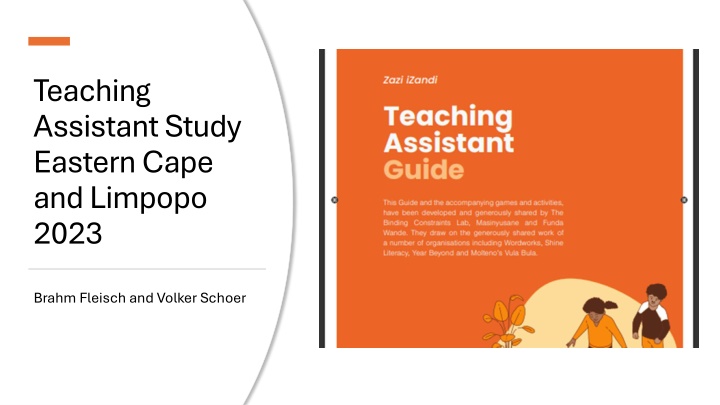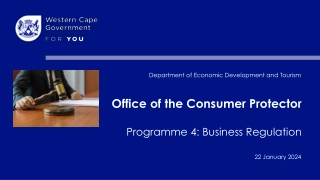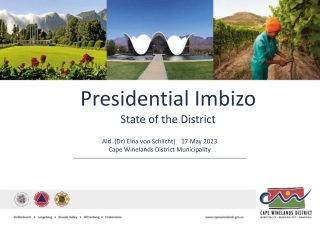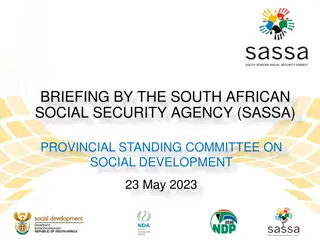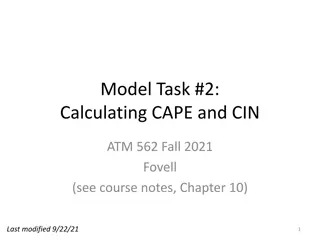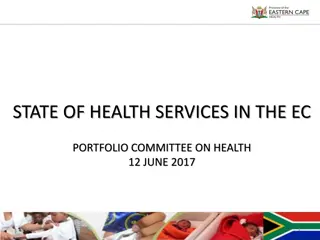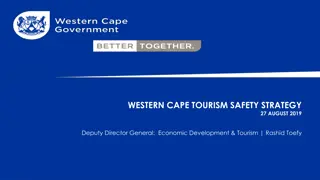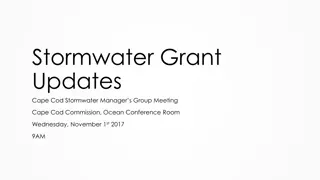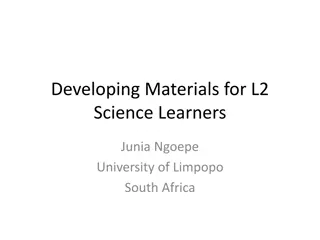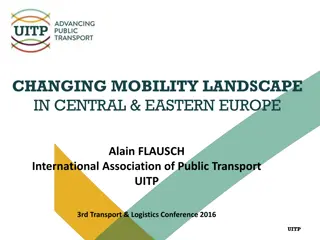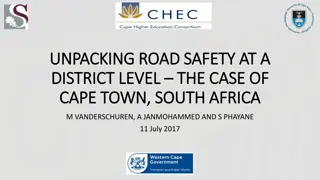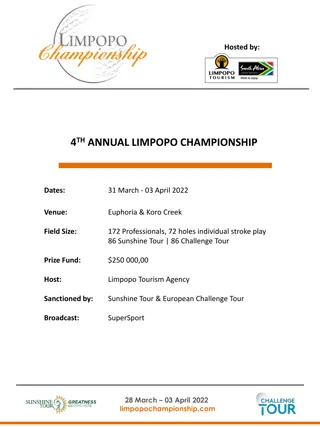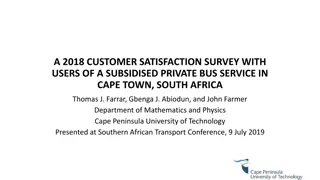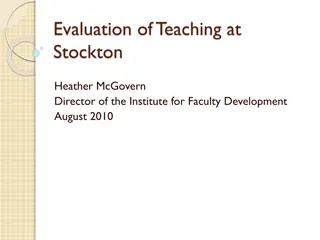Teaching Assistant Study in Eastern Cape and Limpopo 2023 Evaluation
This study evaluates the impact of Teaching Assistants on foundational literacy and numeracy in Grade R and Grade 1 learners in Eastern Cape and Limpopo. Examining theory of change, implementation, and intervention outcomes, it aims to address challenges in literacy development. Key areas of focus include letter knowledge, phonological processing, and mentoring support for young children.
Download Presentation

Please find below an Image/Link to download the presentation.
The content on the website is provided AS IS for your information and personal use only. It may not be sold, licensed, or shared on other websites without obtaining consent from the author.If you encounter any issues during the download, it is possible that the publisher has removed the file from their server.
You are allowed to download the files provided on this website for personal or commercial use, subject to the condition that they are used lawfully. All files are the property of their respective owners.
The content on the website is provided AS IS for your information and personal use only. It may not be sold, licensed, or shared on other websites without obtaining consent from the author.
E N D
Presentation Transcript
Teaching Assistant Study Eastern Cape and Limpopo 2023 Brahm Fleisch and Volker Schoer
Background Eight out of 10 learners in Grade 4 cannot read for meaning in their home language. (PIRLS 2021) Problem begins early, challenges with Letter Knowledge in Grade R and Grade 1
Context Government introduced Teaching Assistance into schools in 2021 Uncertain function of TAs in schools Opportunity to use TAs to assist with Foundational Literacy and Numeracy Zaza Zandiproject supported by the Presidency, Binding Constraints Lab and funded by DGMT Fleisch and Schoer to undertake the evaluation
Research Questions What was the theory of change in the intervention? Was the intervention implemented as intended? What was the impact of the intervention?
Literature Review Established causal link between the failure to learn letter names and letter sounds and the failure to read (McBride-Chang et al, 1999; Hulme et al 2012). Treiman s (2013) letter knowledge is not a sufficient condition for becoming a fluent reader (particularly in English), it is an important first step towards mastery of the writing system. Koel Foulin s (2005) on three mechanisms. Strong letter knowledge linked to phonological processing, letter-sound correspondences and phonemic sensitivity skills. Funde et al (2020) in any countries that use the Roman alphabet is to introduce one letter per week, suggesting that children would master the entire alphabet in roughly half a school year by the middle of the Grade 1. Makaluza & Mpeta (2022) found that a FLN TA intervention improved Grade 1 literacy by 0.44 standard deviation improvement.
Intervention ZaziLP and EC in 6 weeks in Term 4 2023 Recruitment & matching (youth to pass competency assessments and identified as likely to enjoy working with young children) GAMES 1. 2. 3. 4. 5. 6. Memory game Snakes and ladders Snap I spy Letter writing practice Hopscotch Training (ideally face-to-face or blended) Letter knowledge assessment instrument Quality learning materials Mentoring (regular site-visits and ongoing support) Monitoring, Evaluation & Learning (MEL)
Theory of learning/Theory of Change Structured Pedagogy Teach at the Right Level Learning through Play
Implementation Average number of sessions in the Eastern Cape Average # sessions Grade Graduated # of learners 9.2 1 Yes 507 12.8 1 No 615 11.2 1 Total 1122 15.0 R Yes 39 12.7 R No 737 12.8 R Total 776
Qualitative Observations - All TAs had a small area on some carpet or a little mat on the floor on the back or edge of class. - Group sizes ranged from 5 7 learners - TAs appeared to be familiar with the games and set up process was rapid. - The TAs reviewed the previous lesson letters and introduced the new letters with the picture cards. - The learners appeared to be adjusted to the new routines. - In terms of the social and emotional tone of the groups, the TAs appears to be emotionally connected to the learners. - The top groups would graduate out of the programme within the first week. - The TAs noted that struggling groups, as would be expected, had more difficulty consolidating their letter knowledge. - The one area that TAs required the most assistance with was in the initial grouping of the learners based on the first letter knowledge assessment task.
Impact Evaluation Baseline and Endline Phase 2 pilot 10 schools (30 learners per school) Eastern Cape and Limpopo External Evaluators
Attrition School 1 Primary School 2 Primary School 3 Primary School 4 Primary School 5 Primary School 6 Primary School 7 Primary School 8 Primary School 9 Primary School 10 Primary School Total Baseline 30 30 30 35 27 28 26 28 31 24 289 Endline Missing data 8 1 1 1 3 5 1 1 2 23
Average # Letters Correct at Baseline and Endline for Gr R & Gr 1 Baseline # Endline # Average Average 242 122 120 242 122 120 Grade 1 Grade R 25.07 3.77 Grade 1 Grade R 31.69 8.67
Share of correct Letters to attempted Letters Baseline vs Endline (by Grade)
Regression output of the number of letters attempted and correct letters (Z-scores) (1) Attempted letters Attempted letters Correct letters (2) (3) (4) Correct letters (5) Correct/ attempted letters Model 1 0.501** (6) Correct/ attempted letters Model 2 0.500*** VARIABLES Model 1 0.263*** Model 2 0.262*** Model 1 0.254** Model 2 0.253** Grade R (Endline) (0.0855) 1.111*** (0.0865) 1.010*** (0.0889) 1.114*** (0.0874) 0.982*** (0.185) 1.194*** (0.171) 1.063*** Grade 1 (Baseline) (0.141) 0.0997 (0.205) (0.133) 0.0939 (0.207) 0.399*** (0.0777) 0.0961 (0.0716) 0.205** (0.137) 0.0791 (0.192) (0.126) 0.0744 (0.194) 0.356*** (0.0680) 0.126 (0.0762) 0.170** (0.101) -0.297* (0.168) (0.114) -0.297 (0.171) 0.298*** (0.0679) 0.140* (0.0727) 0.0419 Endline*Grade 1 Female Student age Books at home (yes=1) (0.0714) -0.0854 (0.0671) -0.127 (0.0773) -0.244 Limpopo province (0.108) -1.547*** (0.362) (0.128) -1.623*** (0.377) (0.163) -1.578*** (0.371) Constant -0.776*** (0.0520) -0.772*** (0.0461) -0.821*** (0.112) Observations R-squared 484 0.393 484 0.460 484 0.387 484 0.445 484 0.313 484 0.360
Discussion Zazi iZandi programme design is consistent with current educational change thinking. Programme designed meets TAM principles. Intervention addresses an important precondition for learning to read with understanding. Although the teacher assistants have neither the level of training nor the experience of most fully qualified teachers, the narrow focus on improving learners letter knowledge may enable young people to make a meaningful educational contribution.
Conclusion The findings of the Phase 2 pilot study of the Zazi Zandi intervention, provides a strong basis for moving to the next evaluation phase. Phase 3 randomised control trial should include a longer intervention and possibly include additional letter knowledge skills.
